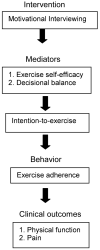Research to Encourage Exercise for Fibromyalgia (REEF): use of motivational interviewing design and method
- PMID: 20828634
- PMCID: PMC3005851
- DOI: 10.1016/j.cct.2010.08.014
Research to Encourage Exercise for Fibromyalgia (REEF): use of motivational interviewing design and method
Abstract
Fibromyalgia (FM), defined as the presence of both chronic widespread pain and the finding of 11/18 tender points on examination, is an illness associated with major personal and societal burden. Supervised aerobic exercise is an important treatment modality to improve patient symptoms. Unfortunately, adherence to an exercise regimen after a structured supervised program is disappointingly low. Since FM is a chronic illness, studies are needed to test strategies that would enhance exercise adherence in these individuals. Individuals who are able to adhere to exercise almost always maintain the symptomatic benefits of exercise. The objective of this paper was to describe the protocol of the Research to Encourage Exercise for Fibromyalgia (REEF). REEF is a randomized attention-controlled trial that seeks to test the efficacy of 6 sessions of telephone delivered motivational interviewing (MI) that targets exercise adherence to improve FM-relevant clinical outcomes (i.e., physical function and pain severity). The trial has recently completed enrolling 216 subjects, and randomization has resulted in well-balanced groups. Details on the study design, MI program, and treatment fidelity are provided in the paper. Outcome assessments at week 12, week 24 and week 36 will test the immediate, intermediate and long-term effects of exercise-based MI on adherence (as measured by the Community Health Activities Model Program for Seniors/CHAMPS and accelerometer) and clinical outcomes. When completed, REEF will determine whether exercise-based MI could be utilized as a management strategy to sustain the clinical benefits of exercise for FM.
Copyright © 2010 Elsevier Inc. All rights reserved.
Figures
Similar articles
-
Research to encourage exercise for fibromyalgia (REEF): use of motivational interviewing, outcomes from a randomized-controlled trial.Clin J Pain. 2013 Apr;29(4):296-304. doi: 10.1097/AJP.0b013e318254ac76. Clin J Pain. 2013. PMID: 23042474 Free PMC article. Clinical Trial.
-
Motivational interviewing to increase physical activity in long-term cancer survivors: a randomized controlled trial.Nurs Res. 2007 Jan-Feb;56(1):18-27. doi: 10.1097/00006199-200701000-00003. Nurs Res. 2007. PMID: 17179870 Clinical Trial.
-
Sustained Benefits of Exercise-based Motivational Interviewing, but Only among Nonusers of Opioids in Patients with Fibromyalgia.J Rheumatol. 2017 Apr;44(4):505-511. doi: 10.3899/jrheum.161003. Epub 2016 Dec 1. J Rheumatol. 2017. PMID: 27909084 Free PMC article. Clinical Trial.
-
Motivational interviewing may encourage exercise in persons with fibromyalgia by enhancing self efficacy.Arthritis Rheum. 2004 Oct 15;51(5):864-7. doi: 10.1002/art.20684. Arthritis Rheum. 2004. PMID: 15478154 Review. No abstract available.
-
Mixed exercise training for adults with fibromyalgia.Cochrane Database Syst Rev. 2019 May 24;5(5):CD013340. doi: 10.1002/14651858.CD013340. Cochrane Database Syst Rev. 2019. PMID: 31124142 Free PMC article.
Cited by
-
Predictors for health improvement in patients with fibromyalgia: a 2-year follow-up study.Clin Rheumatol. 2015 Jan;34(1):133-41. doi: 10.1007/s10067-013-2371-7. Epub 2013 Aug 24. Clin Rheumatol. 2015. PMID: 23975362 Clinical Trial.
-
Effect of moderate to vigorous physical activity on long-term clinical outcomes and pain severity in fibromyalgia.Arthritis Care Res (Hoboken). 2013 Aug;65(8):1211-8. doi: 10.1002/acr.21980. Arthritis Care Res (Hoboken). 2013. PMID: 23401486 Free PMC article. Clinical Trial.
-
Physical Condition Factors that Predict a Better Quality of Life in Women with Fibromyalgia.Int J Environ Res Public Health. 2019 Aug 30;16(17):3173. doi: 10.3390/ijerph16173173. Int J Environ Res Public Health. 2019. PMID: 31480366 Free PMC article.
-
Does increasing steps per day predict improvement in physical function and pain interference in adults with fibromyalgia?Arthritis Care Res (Hoboken). 2014 Dec;66(12):1887-94. doi: 10.1002/acr.22398. Arthritis Care Res (Hoboken). 2014. PMID: 25049001 Free PMC article. Clinical Trial.
-
Obesity Moderates the Effects of Motivational Interviewing Treatment Outcomes in Fibromyalgia.Clin J Pain. 2018 Jan;34(1):76-81. doi: 10.1097/AJP.0000000000000500. Clin J Pain. 2018. PMID: 28272119 Free PMC article. Clinical Trial.
References
-
- Wolfe F, Smythe HA, Yunus MB, Bennett RM, Bombardier C, Goldenberg DL, et al. The American College of Rheumatology 1990 Criteria for the Classification of Fibromyalgia. Report of the Multicenter Criteria Committee. Arthritis Rheum. 1990;33:160–172. - PubMed
-
- Wolfe F, Ross K, Anderson J, Russell IJ, Hebert L. The prevalence and characteristics of fibromyalgia in the general population. Arthritis Rheum. 1995;38:19–28. - PubMed
-
- Goldenberg DL, Burckhardt C, Crofford L. Management of fibromyalgia syndrome. JAMA. 2004;292:2388–2395. - PubMed
-
- Sim J, Adams N. Systematic review of randomized controlled trials of nonpharmacological interventions for fibromyalgia. Clin J Pain. 2002;18:324–336. - PubMed
-
- Busch A, Schachter CL, Peloso PM, Bombardier C. Exercise for treating fibromyalgia syndrome. Cochrane Database Syst Rev. 2002:CD003786. - PubMed



